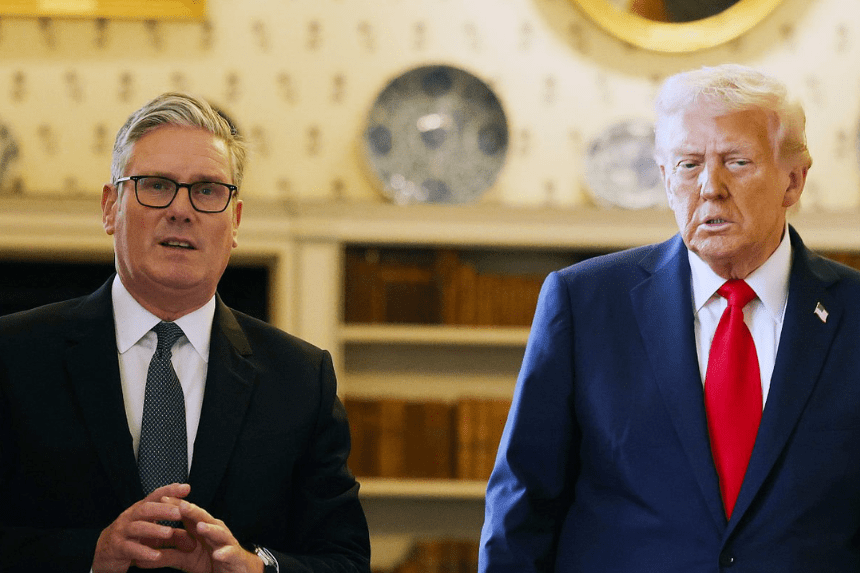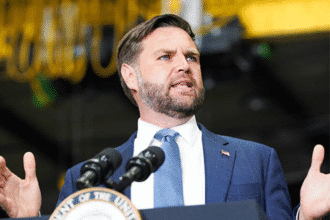U.S. President Donald Trump and UK Prime Minister Sir Keir Starmer held a joint press conference at Chequers, marking the end of Trump’s second official state visit to the United Kingdom. The meeting offered a high-level glimpse into the current state of UK-US relations, covering sensitive topics such as the Middle East, migration, Ukraine, and media freedom.
Both leaders expressed mutual respect throughout the session, maintaining a diplomatic tone despite a few clear policy differences. The press conference lasted under an hour but provided important signals about the future direction of transatlantic cooperation.
How Did They Address the Palestine Issue?
One of the most contentious topics was the UK’s upcoming recognition of Palestinian statehood. Trump, who has previously criticized similar moves, acknowledged a “disagreement” with Starmer but emphasized it was among only “a few” differences between them.
Starmer made it clear that the decision was not connected to Trump’s visit. He said it was part of a broader peace strategy for the Middle East and reiterated that Hamas, a group the UK considers a terrorist organization, would have “no role” in a future Palestinian state.
Trump appeared satisfied with that stance, even giving Starmer a friendly gesture during the exchange. Here is the link to our article on Mamdani Politics Shift.
What Did They Say About Illegal Migration?
Migration also took center stage. With record numbers of small boats crossing the English Channel, Trump didn’t hesitate to offer strong advice. He suggested military intervention, stating that illegal immigration “destroys countries from within.”
He referenced U.S. border policies and encouraged Starmer to consider similar tactics. Starmer responded by highlighting progress on the issue, including the departure of the first flight under a UK-France migrant return agreement.
This showed a shared concern but diverging strategies between the two leaders on how to manage border security.
Are the UK and the US Aligned on Ukraine?
On the conflict in Ukraine, Trump and Starmer showed clear alignment. Both condemned recent Russian actions and expressed commitment to supporting Ukraine’s sovereignty.
Trump admitted he had underestimated the complexity of the war. However, he defended his earlier summit with Russian President Vladimir Putin, claiming it was a necessary step given the scale of the humanitarian crisis.
Starmer, meanwhile, criticized recent Russian missile strikes, particularly one that damaged a British diplomatic site in Kyiv. He made it clear that Russia’s recent actions were incompatible with any claims of seeking peace. Here is the link to our article on Coalition Politics Rift.
Was Free Speech a Point of Conflict?
Free speech was expected to be a divisive topic following recent U.S. political commentary critical of European policies. However, Trump opted to skip over the issue when questioned directly, offering no further insight.
Starmer took the opportunity to reaffirm the UK’s stance. He called free speech one of the nation’s “founding values” and said it would be protected “fiercely.” Still, he noted the need to balance freedom with public safety, including safeguarding children from harmful online content.
How Did Mandelson’s Sacking Impact the Event?
The press conference took place just days after Starmer dismissed former Labour minister Lord Peter Mandelson from a key diplomatic role. The decision was linked to Mandelson’s past connections with convicted sex offender Jeffrey Epstein.
Asked whether he sympathized with Mandelson, Trump distanced himself, stating, “I don’t know him.” This came despite the two having previously met during an official visit. Starmer reiterated that Mandelson’s removal followed the emergence of new information regarding his personal associations.
While potentially awkward, the issue did not dominate the press conference, allowing both leaders to maintain focus on broader diplomatic matters.
Final Thoughts
The joint appearance by Trump and Starmer revealed a careful but functional dynamic in modern UK-US relations. While some disagreements remain, particularly on Middle Eastern policy and migration strategies, both leaders presented a united front on global security and diplomatic values.
As the international landscape grows more complex, maintaining strong UK-US relations will remain essential. This meeting reaffirmed the willingness of both nations to cooperate—even when views differ—on some of the world’s most pressing challenges.








